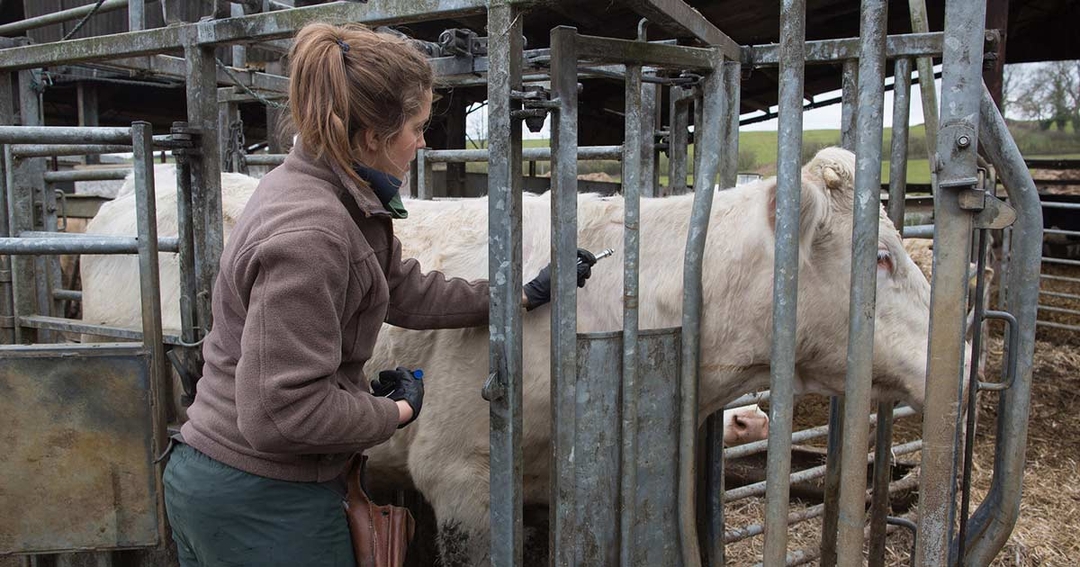22 Apr 2021
More practices across England are taking the opportunity to add paraprofessional staff to their teams to become approved tuberculin testers since APHA approval.

Vet practices can now recruit para-professional staff to train as Approved Tuberculin Testers (ATTs) of beef and dairy cattle. IMAGE: Agriphoto library
Farm animal practices are recruiting paraprofessionals from the agricultural sector to help cope with the increase in bTB testing required in swathes of England.
The APHA allowed non-vets to become approved tuberculin testers (ATT) last November, and a growing number of practices are seeing the opportunities to add paraprofessional staff to the vet-led team.
Frequency of surveillance testing in England’s high-risk area (HRA) is being increased from annually to six-monthly in 2021, following initial introduction in Shropshire and Staffordshire late last year.
The APHA’s approval for non-vets to carry out bTB testing means staff can be employed and equipped, and paid, as part of the practice team once they have completed appropriate training to become an ATT. ATTs can also access the training and become self-employed, providing services across several practices.
UK Farmcare helps manage Government TB testing in England, and director James Allcock said 33 people were already qualified as ATTs, with 23 more in training. He said the new job opportunities in practices were already being advertised across farming media.
Mr Allcock said: “This development has been broadly welcomed by many vet practices in England, and some have already got to grips with the opportunity.
“I’ve had reports of vets enjoying the chance to help people develop new skills and saying trained ATTs are relishing the added responsibility. Vets also appreciate the valuable extra manpower.”
He said about 1,400 vets in England and Wales can carry out TB testing, but fewer than 50 do so on a full-time basis.
Last year, around six million TB tests were carried out on cattle in England, with full-time TB testers commonly testing up to 2,000 cattle per month.
Mr Allcock added: “It seems likely that ATTs will replace some of the full-time TB testers, many of whom have taken up opportunities to support food exports since the start of the year.
“However, several ATTs are already important members of the vet practice team and already support some of the health management work on farm. TB testing may well become another ‘string to their bow’.”
BCVA president Nikki Hopkins said the addition of ATTs had potential to help many practices facing an uptick in testing requirements. She said: “The BCVA recognises that the extensive roll‑out of six-monthly testing into more areas of the HRA in England could put a further strain on veterinary capacity, so ATTs are a potentially beneficial, flexible and adaptable resource for some practices.
“They will not suit all practice models, but it is very important that they are welcomed as part of a vet-led practice team approach. This will help to ensure the good standards of TB testing achieved by ATTs during the 2020 pilot by the APHA are consistently maintained, and communications regarding the bTB status of clients’ farms can be optimised within the practice.”
Ian Cure, farm director at VetPartners, said the group had 12 ATTs already, with a plan for more.
He said: “The challenge is the training and support of the technicians as they require one‑to-one training and mentoring, so you still need as many OVs and these are what are in short supply. So creativity is required for this, and collaboration between our practices.
“We are working on a training scheme internally to help upskill these technicians and provide them a career pathway that may work alongside our vet-tech role (recently recognised with a qualification), and potentially to support exports with using them as certification support officers.”
Vet practices wanting further information on the ATT role can telephone UK Farmcare on 0800 612 5289 or email [email protected]